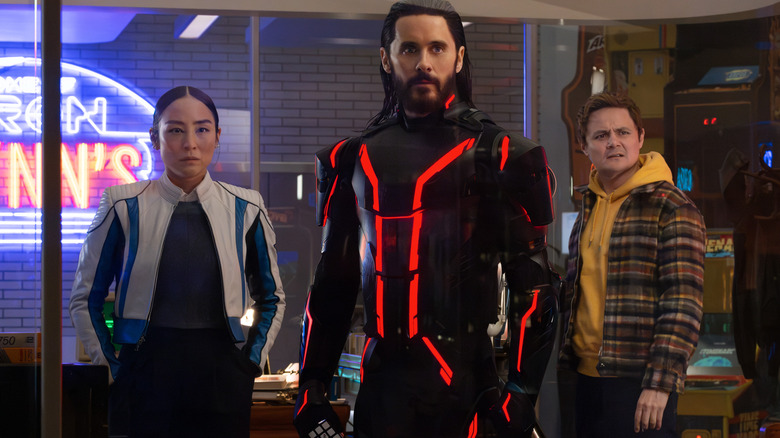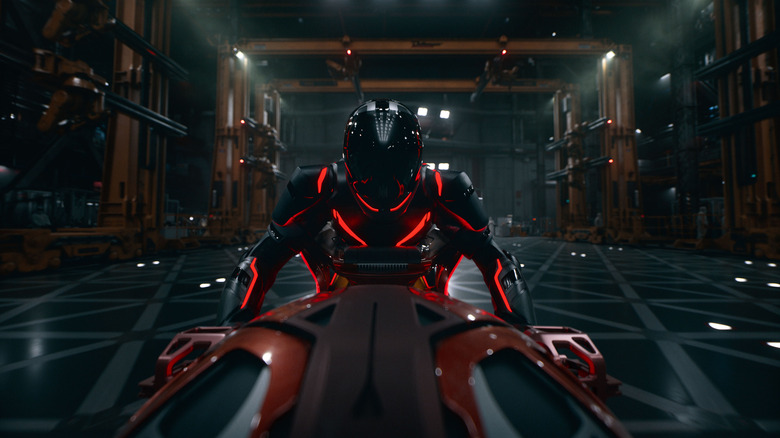Tron: Ares Review: A Thoughtless Sequel With An Uncharismatic Lead But A Pretty Great Soundtrack
Watching Joachim Rønning's new cyber-thriller "Tron: Ares" — the third "Tron" feature in 43 years — I found myself wondering just how everything was supposed to work. In the universe of "Tron," humans write computer programs, but those programs actually manifest themselves as humanoid beings deep within a separate electric dimension. The programs not only have free will, but a whole theology, worshiping their programmers — their Users — as gods. The ethics of haphazardly creating and deleting intelligent digital slaves was sort of the topic of Joseph Kosinski's 2010 "Tron: Legacy," a pretty cool film, but one that doesn't delve nearly deeply enough into its moral and theological themes. It was Frankensteinian, a warning that your creations will become monsters.
In Steven Lisberger's original "Tron," it was introduced that a specialized laser can reduce humans into energy patterns and insert them into the electric dimension — the Grid — where they appear as programs. It's astonishing to think that a 1982 hard drive was already sophisticated enough to contain a whole human consciousness. That's a lot of terabytes. The laser can also restore the humans to their fleshy selves.
"Tron: Ares" features a computer security program named Ares (Jared Leto) who can be manifested in the real world via an ultra-sophisticated 3D printer. He looks like he's made of flesh and blood, but is likely constructed from some kind of plastic. The 3D printers can also manifest complex motorcycles, cars, tanks, angel wings, and airships, all machines that seem to have an infinite power supply, and that can create mile-long, six-foot-high walls in their wake as they speed through the streets and skies of a modern human city.
And if I'm sitting there wondering what Jared Leto's skin is made of, or how a cyber-cycle can power itself, then I'm clearly disengaged with whatever story "Tron: Ares" is trying to tell. This movie is quite bad.
Tron: Ares is all plot, no thought
"Tron: Ares" is all plot and no heart. Almost every scene is full of exposition, with characters explaining themselves, explaining what they're doing in that room, explaining why they need this-or-that laser gun. I value clarity in movies, but this is one cyber-toke over the line. Evan Peters plays Julian Dillinger, the grandson of David Warner's character from 1982's "Tron," and he has invented a miracle laser that can, as mentioned, 3D print artificially intelligent android-people, as well as tank-sized, fully-powered war vehicles, in a matter of minutes. He aims to sell the technology to weapons manufacturers, which shows an astonishing lack of imagination. If a laser can create a fully-powered, high-tech super-vehicle in a matter of minutes, all with seemingly little power drain and no waste, then the world's travel infrastructure is more or less taken care of in perpetuity.
Dillinger likes to print out his chief security program, Ares, to show him off at demos. The only issue is that the items Dillinger prints only last for 29 minutes before crumbling into dust. He requires a mythical Permanence Code to make the printed items last forever. Luckily for him, an old business rival named Eve Kim (Greta Lee, whose talents are wasted) is working to find such a code, locked somewhere deep in the computers of Kevin Flynn, Jeff Bridges' character from the original "Tron." Eve Kim is the thinnest character seen in blockbuster movies since "F1," possessing no personality beyond a pang of mourning for a recently deceased sister. Lee is a nuanced, intense performer, but Kim is such a nothing character. Like many other people in "Tron: Ares," she's saddled with explaining to the audience what's going on from scene to scene.
Tron: Ares has little imagination
When Eve finds the Permanence Code, she reveals that she can create living, edible fruit with it. If this was always a possibility, then why is anyone mucking about with weapons manufacturing? This is a device that can literally create pre-programmable people out of thin air, and also solve world hunger. This is a machine that can rid the world of want, of money, of scarcity. It would usher in a new age for humanity. But the characters in "Tron: Ares," for all their over-explaining of the plot, never stop to remark on the enormity of their invention. Instead, they print out human slaves and send them on motorcycle fetch-quests to retrieve MacGuffins. There are several tantalizing sci-fi ideas within "Tron: Ares" that the filmmakers aren't the least bit interested in exploring.
Jared Leto also proves to be a less-than-stellar leading man. Ares is a living computer program, one that has had little direct contact with humanity, and only obtains information by psychically scanning every computer everywhere. He's capable and violent, but childlike and naïve. There is a cute scene late in the film wherein Ares admits that his love for Depeche Mode cannot be summed up in words. Ares needs to be stiff and mechanical, but have a slight spark, a twinkle in his eye to assure viewers that he has some humanity deep within. Leto cannot manifest that spark, that twinge of humor. As such, Ares is not an interesting, charming action character. He's no Brent Spiner.
His motives are vague. He longs for the Permanence Code, but when his printed avatar in the real world is destroyed, his consciousness merely shunts its way back into the computer. It's not until late in the film that he passingly mentions that he'd rather not be a slave anymore. Perhaps that should have come up earlier.
At least the music in Tron: Ares is good
Other actors are wasted as well. Gillian Anderson has a thankless role as Dillinger's mother, who only exists to warn him that he's taken things too far. Arturo Castro plays Eve Kim's "comedy" sidekick, but only seems to exist to give Eve someone to explain things to. Availing herself the best was Jodie Turner-Smith as Athena, another security program who is regularly brought into the real world, and who is driven by her aggression and her cold devotion to the task at hand.
Just as "Tron: Legacy" boasted a unique, landmark score by Daft Punk, "Tron: Ares" gets a great deal of auditory mileage from the electronic intensity of Nine Inch Nails. The score is gorgeous in a vacuum, musically describing a much more complex, interesting film than the one we're watching. One could purchase the soundtrack record for "Tron: Ares" and get more out of it than watching the movie itself.
And then, in addition to being distracted by the impractical physics of "Tron," and being utterly un-charmed by Leto's performance, I began idly wondering what we're still doing here. "Tron" was released in 1982, back when computers were ineffable and byzantine machines. The general public didn't know how they worked very well, so we may as well envision tiny people living inside them, arranged into a tiny society. Extending that thought, if a 1982 computer can hold a whole society, how many people can you trap in your Apple Watch? In 2025, computers have only become more powerful, and addressing their capabilities (positive and negative) is a real-life concern. And are we going to be able to address the right technological questions and concerns using a late-stage sequel to a cyber thriller from 43 years ago? Perhaps interesting topics could have been explored in a "Tron" movie, but "Tron: Ares" ain't it.
/Film Rating: 4 out of 10
"Tron: Ares" opens in theaters on October 10, 2025.



